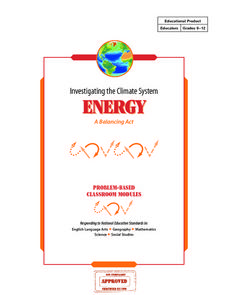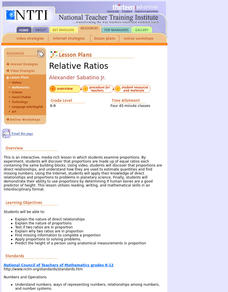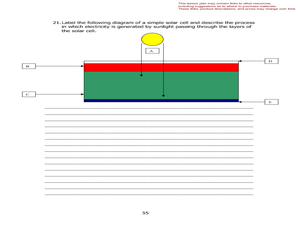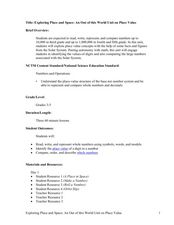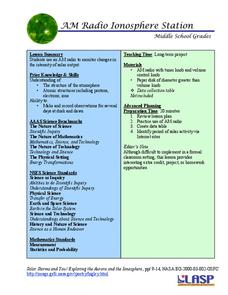Teach Engineering
Get Me Off This Planet
What do Newton's Laws have to do with getting from Earth to Mars?The activities in this resource show how Newton's Laws work with rockets to get them into space. Background information includes facts about orbits and how orbits are used...
Curated OER
Investigating the Climate System: Energy, A Balancing Act
Earth science explorers design an experiment to demonstrate that the albedo of a surface affects its temperature. They test to find out if moisture on the surface affects temperature. They discover whether or not concrete or asphalt heat...
Curated OER
Building a Scale Model
Third graders create a model of the solar system. In this solar system instructional activity, 3rd graders create a scale model of the solar system. Working in pairs students solve mathematical problems to correctly measure the distance...
Curated OER
The Nine Planets
Sixth graders examine and investigate the solar system. They participate in a Webquest, and create a Powerpoint presentation that is meant to be a research guide to help alien visitors find a suitable habitat in the solar system.
Curated OER
Attributes of Renewable Energy: From Nanopossibilities to Solar Power
High schoolers explore solar energy, why we use it and how we use it. In this renewable energy lesson students compare active and solar techniques.
Curated OER
Spacing Out the Solar System
Sixth graders practice applying their problem-solving skills as they measure circular objects and make connections to planets. They identify and describe measurable attributes of objects and units of measurement and solve problems...
Teach Engineering
Designing a Spectroscopy Mission
In this mind-bending activity, young engineers explore this question of whether or not light actually bends. Using holographic diffraction gratings, groups design and build a spectrograph. The groups then move on research a problem...
Curated OER
The Sun-Earth Connection
Third graders research about the location of different planets from the sun. For this earth science lesson, 3rd graders discuss the weather in their place and identify common weather terminologies. They explain how tornadoes form and...
Curated OER
PLANETS IN PROPORTION
Students discover scales for both the solar bodies' relative sizes and their distances from the sun. They find equatorial circumference and volumes of their solar bodies. Students apply estimation strategies and proportioanl reasoning to...
Curated OER
Exploring Magnetism in Solar Flares
Students apply concepts of magnetism to help them understand the production of solar flares. In this solar flare lesson, students complete activities and graphic organizers to help them learn about magnetic fields on the surface of the...
Curated OER
Our Amazing, Powerful Sun
Learners examine where energy comes from and how it can be used. In this solar energy lesson students explore different aspects of the sun.
Curated OER
Relative Ratios
Students discover that proportions are made up of equal ratios each containing the same building blocks. They, using the Internet, apply their knowledge of direct relationships and proportions to problems in planetary science.
Curated OER
Earth
Fourth graders engage in a study of the solar system. The teacher constructs an outside model of it. They walk through it making constructive observations. Students conduct a class discussion about the solar system and planets. They...
Curated OER
Where Are We Going?
Students practice rounding numbers to ones and tens places, multiplying numbers, and working with simple fractions. They study the placement and distances of planets in the Solar System.
Curated OER
Exploring the Celestial Neighborhood
Ninth graders study the origin and organization of the solar system. They investigate the Earth's place in the system and how planetary motions explain natural phenomena observable from Earth.
University of Colorado
Are All Asteroids' Surfaces the Same Age?
There are more than 600,000 asteroids in our solar system. Pupils analyze images of two asteroids in order to determine if they are the same age. They count craters for each asteroid and compare numbers.
Curated OER
Traveling Through the Solar System
Students use calculator and non-calculator methods for analyzing data. They apply data collection and analysis in a study of mass and weight. Students enhance and apply the concept of line of best fit. They master graphing in a plane,...
Curated OER
Photovoltaics and Solar Energy
Students experiment with photovoltaic cells and determine the energy use of their appliances. In this renewable energy lesson plan, students calculate the energy emitted by a photovoltaic cell through an inquiry-based lab. They keep...
Curated OER
Planetary Orbits
Students explore space science by completing a solar system identification worksheet. In this planets lesson, students discuss the different planets in our star system and identify their traits. Students complete an orbital system...
Curated OER
Exploring Place and Space
Students explore number values by completing mathematical worksheets in class. In this decimals lesson, students identify the different place values a number has and the use of decimals to represent a fraction of a number. Students...
Laboratory for Atmospheric and Space Physics
Growing Up With A Mission
New Horizons began its journey to Pluto in 2006. Ten years later, it continues its mission. In that time, scholars have surely grown, but how much more will they grow by the time New Horizons reaches its destination? Find out with an...
University of Colorado
The Moons of Jupiter
Can you name the three planets with rings in our solar system? Everyone knows Saturn, many know Uranus, but most people are surprised to learn that Jupiter also has a ring. The third in a series of six teaches pupils what is around...
PHET
AM Radio Ionosphere Station
Tune in! Young scientists use an AM radio at home to monitor solar output. The long-term project would be ideal in a flipped classroom or as an out-of-class project.
Curated OER
An Overview of Solar Radiation
Students examine the Stefan-Boltzmann Law. Students compute basic radiative "constants" of the sun-Earth-atomosphere system. They examine the wavelength of maximum radiation emission.



